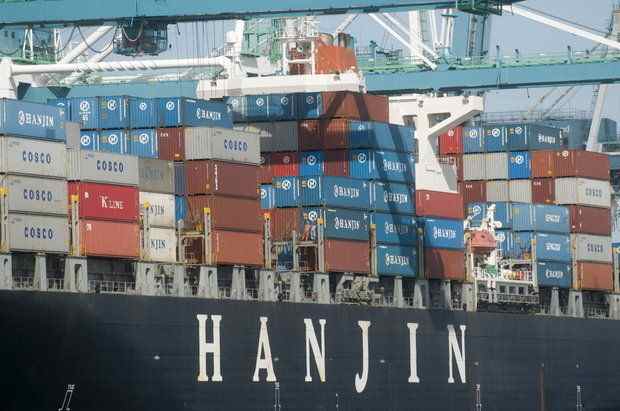forum
library
tutorial
contact

Port of Portland Director: Speed Up
Longshore Work or Lose Hanjin Cargo Ships
by Richard Read
The Oregonian, November 12, 2012
|
the film forum library tutorial contact |

|
Port of Portland Director: Speed Up
by Richard Read
|
 Bill Wyatt, Port of Portland executive director, returned from China Tuesday with an ultimatum from Hanjin Shipping Co. Ltd. managers: Speed up work on the docks, or say goodbye to our cargo vessels.
Bill Wyatt, Port of Portland executive director, returned from China Tuesday with an ultimatum from Hanjin Shipping Co. Ltd. managers: Speed up work on the docks, or say goodbye to our cargo vessels.
"I'm bringing the message back from the carriers that productivity is the only issue that prevents them from continuing service in Portland," said Wyatt, in a direct challenge to the International Longshore and Warehouse Union.
Therefore Wyatt said he wants to enter negotiations with the union to speed up loading and unloading ships at the Port's container terminal. Failing that, he says, Hanjin will proceed with its plan announced in October to stop calling on Portland in January, ditching Northwest exporters and importers.
It's unclear whether anyone at the Portland longshore local or union headquarters in San Francisco would enter such talks. An ILWU spokeswoman did not immediately respond Tuesday to requests for comment.
In the past the union has denied staging slowdowns and blamed the terminal operator, ICTSI Oregon Inc., for bad management. Orders by U.S. District Judge Michael Simon and months of litigation have failed to bring up productivity.
Wyatt said he's ready to meet with the longshore union, the International Brotherhood of Electrical Workers, ICTSI and others in search of an 11th-hour solution. He said Hanjin's impending departure could encourage longshore interest in a deal.
"It's going to require everybody to work together," Wyatt said. "I am fully prepared to engage with the ILWU, the IBEW and other interests in our shipping community to see if there isn't a way that we can find a path forward here."
An exit by Hanjin would be a major blow to the Northwest economy, hurting big importers such as Fred Meyer and Columbia Sportswear Co. and numerous exporters who would have to pay more to truck containers to Washington ports.
But the departure might not do much damage to the ILWU, which holds a West Coast monopoly on cargo handling. Its Portland members would lose work if they didn't move or travel -- Terminal 6 amounts to a $30 million annual payroll -- but longshore workers would still handle the cargo at the ports of Seattle and Tacoma.
Hanjin managers have complained that ICTSI is raising rates to prohibitive levels. But in China, Wyatt said, executives of the South Korean shipping line said the high rates result directly from low longshore productivity.
"The revenue that terminal operators earn is by the box and the cost that they incur is by the hour," Wyatt said. "A 29-to-30-boxes-per-hour move count is historical. But when it slips down to 19 to 20 it costs them significantly more money to handle the same amount of cargo."
Delayed vessels cause shipping lines to miss expensive "berth windows" in busy Asian ports, "throwing their entire service out of whack," Wyatt said.
Wyatt said Hanjin managers told him, "'We need to see tangible evidence that the labor problem is resolved, or on the way to being resolved, because without that we simply cannot afford Portland.'"
But Wyatt also said that Hanjin managers didn't promise him they'd continue calling on Portland if productivity rose to a certain level. In the shipping industry, he said, "there are no guarantees of anything."
learn more on topics covered in the film
see the video
read the script
learn the songs
discussion forum
